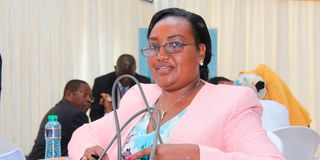One hurdle at a time: Marsabit woman rep's governor bid gets elders' nod

Marsabit woman representative Naomi Waqo. She has received elders' blessings to run for governor come 2027.
What you need to know:
- In a community that is patriarchal, elders' blessings are a crucial step in local politics.
- Region relies on negotiated democracy that always favours men for governor, MP and MCA positions.
Marsabit woman representative Naomi Waqo is following in the footsteps of some of the current women county chiefs in her bid to become governor after the next general election.
In a community that is patriarchal, the lawmaker has received elders’ endorsement and begun election campaigns ahead of 2027.
On February 16, she declared her interest in governorship come the 2027 election.
The Fulele Council of Elders has blessed her ambition, a crucial step in local politics. Fulele is one of the Borana clans.
Northern Kenya, where Marsabit lies, heavily relies on negotiated democracy and elders always prefer men for positions of governor, members of Parliament (MP) and even members of the county assembly.
Therefore, Ms Waqo receiving their blessings is a milestone.
Her endorsement goes against the general belief among the Borana that women are dictators.
They hold that the ancient woman leader, Ako Habonaye, ruled with an iron fist. She was later killed by Rendille community warriors during a peacekeeping meeting.
Also read: The women politicians making a mark
Nairobi Woman Rep Esther Passaris, who attended the endorsement meeting in Moyale town, lauded the elders for taking the lead in emancipating the community from beliefs that deny women leadership positions.
Ms Waqo is, however, not the only one to declare her interest in the seat.
Saku MP Dido Rasso did so last year. And in December 2023, he was also endorsed by a section of the Borana elders. Mr Rasso belongs to the Wargida clan.
Former Treasury Cabinet Secretary Ukur Yatani, former North MP Chachu Ganya, Arid and Semi-Arid Lands and Regional Development Principal Secretary Harsama Kello, and businessman Chachu Chadicha are also expected to join the fray.
In 2022, former Marsabit Tourism Chief Officer Gedhia Mamo was forced by her Sakuye community to drop her gubernatorial bid.
She later vied for woman rep and lost narrowly to Ms Waqo.
Prof Elizabeth Pantoren, the first woman to earn a doctorate among the Rendille in Marsabit, also battled with an avalanche of patriarchal obstacles when she declared her interest in the gubernatorial seat in 2007.
She had to drop out and join an MP race, which she also lost.
Amid all these barriers, early campaigns are a good start for women.
A 2008 study, Why Are Women Still Not Running for Public Office? published on Brookings, found that women were less likely than men to consider running for office and less likely than men to take any of the steps required to mount a political campaign.
To lift women from indecisiveness and inertia, rights advocates have in recent years encouraged those seeking elective seats to start preparing the ground early.
“Women leaders need to create an image long before they vie for elective positions to enable their visibility,” said Greenpeace Africa executive director Njeri Kabeberi in August 2021.
She was speaking during a Quarterly Multisectoral Stakeholder Forum on Women Leadership in Kenya.
“They also need to create a concrete agenda that resonates with the electorate,” she added in the virtual meeting jointly convened by Echo Network Africa, Democracy Trust Fund and Hanns Seidel Foundation-Kenya.
In a past interview, former Gender Cabinet Secretary Margaret Kobia said women have to gradually build a leadership portfolio with the electorate such that the community can easily identify and vouch for them when the time comes for them to seek an elective seat.
The Kenya Women Parliamentary Association (Kewopa), too, prepares women for elective seats through training in aspects such as public speaking, media relations, how to form a political party, and mobilise campaign resources.
“During our training before the last election, we found out that women were interested in vying, but half of them were still wondering whether to go for the position of member of Parliament, senator or member of the county assembly even as the primaries neared.
"And I feel that is where they go wrong,” said Mercy Mwangi in a July 2020 interview when she served as Kewopa’s programme coordinator.
Now, she’s the executive director.
In Nakuru, by 2015, Susan Kihika, then the speaker of the County Assembly, had declared her interest in the county’s senatorial seat.
Come 2017, she won. She served for one term. In the last election, she successfully contested the position of governor.
In Homa Bay, by 2018, Gladys Wanga, then woman representative, had started campaigning to succeed governor Cyprian Awiti.
In the August 2022 election, she won by 244,559 votes against her closest competitor Evans Kidero, who received 154,182 votes.
Earlier, in December 2021, Luo elders from Kochia in Rangwe had endorsed her for the seat.
The decision by the elders, the Star reported, was intended at dissuading residents from voting leaders on the basis of gender and instead considering them on the grounds of their strength to lead and develop their county.
Even male politicians have always employed early campaigns as part of their winning strategy.
By 2018, William Ruto, then Deputy President, had started campaigning for president, four years to the 2022 General Election. Now, he is the President.






